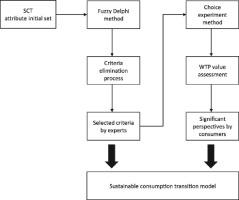Resources, Conservation and Recycling ( IF 11.2 ) Pub Date : 2021-04-01 , DOI: 10.1016/j.resconrec.2021.105590 Chih-Cheng Chen , Raditia Yudistira Sujanto , Ming-Lang Tseng , Minoru Fujii , Ming K. Lim

|
This study aims to identify the consumer-centered attributes that influence consumer willingness-to-pay value for a sustainable consumption transition model. The Indonesian food industry has contributed to an increasing trend of waste generation in the landfill due to irresponsible consumer behaviors resulting a failure in a consumption transition from being traditional to sustainable. Prior studies have indicated that there is a gap between consumers’ intentions and their behaviors. In response, this study attempts to identify the attributes causing such a gap by focusing on consumer behaviors. The model validity is measured by the economic value using consumer WTP. In order to answer the objectives, this study uses a combination of fuzzy Delphi method and choice experiment method with an advantage of being able to assess the attributes based on the expert judgments and consumer preferences, while other studies have not used the combination of these two methods. The results show that social concerns and waste minimization perspectives contribute the most to the sustainable consumption model in which the criteria such as consumers’ sustainable issue interest, responsible waste disposal and health-based products play a major role in influencing consumer WTP. Therefore, based on the perspectives and criteria assessment results, this study contributes to the literature and industry with theoretical and managerial implications.
中文翻译:

可持续的消费转型模型:印度尼西亚食品行业中在支付意愿下的社会关注和废物最少化
本研究旨在确定以消费者为中心的属性,这些属性会影响消费者在可持续的消费转型模型中的支付意愿。印度尼西亚食品工业由于不负责任的消费者行为而导致了垃圾填埋场中废物产生量的增加趋势,导致从传统消费方式向可持续消费方式的转变失败。先前的研究表明,消费者的意图和行为之间存在差距。作为回应,本研究试图通过关注消费者行为来识别造成这种差距的属性。模型的有效性通过使用消费者WTP的经济价值来衡量。为了实现目标,本研究使用模糊德尔菲方法和选择实验方法的组合,具有能够基于专家判断和消费者偏好来评估属性的优势,而其他研究则没有将这两种方法结合使用。结果表明,社会关注和废物最小化的观点对可持续消费模型的贡献最大,在该模型中,诸如消费者的可持续议题利益,负责任的废物处置和基于健康的产品等标准在影响消费者的WTP中起着重要作用。因此,基于观点和标准评估结果,本研究对具有理论和管理意义的文献和行业做出了贡献。结果表明,社会关注和废物最小化的观点对可持续消费模型的贡献最大,在该模型中,诸如消费者的可持续议题利益,负责任的废物处置和基于健康的产品等标准在影响消费者的WTP中起着重要作用。因此,基于观点和标准评估结果,本研究对具有理论和管理意义的文献和行业做出了贡献。结果表明,社会关注和废物最小化的观点对可持续消费模型的贡献最大,在该模型中,诸如消费者的可持续议题利益,负责任的废物处置和基于健康的产品等标准在影响消费者的WTP中起着重要作用。因此,基于观点和标准评估结果,本研究对具有理论和管理意义的文献和行业做出了贡献。











































 京公网安备 11010802027423号
京公网安备 11010802027423号